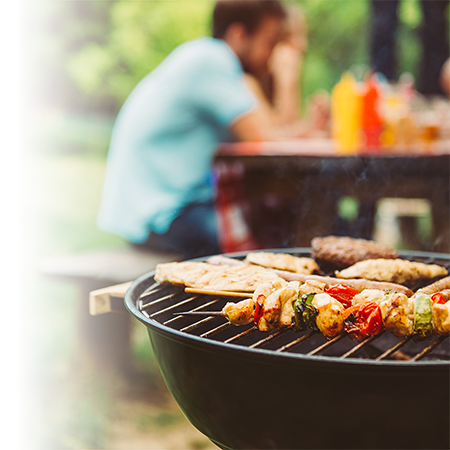In summer, there's no shortage of opportunities to get together for an outdoor meal. That said, food poisoning can spoil your fun.
Food poisoning: a summer classic!
When summer is in full swing, it's fun to get together around the pool, near the barbecue or for a picnic to fully enjoy your vacation. However, these moments of joy, sometimes involving carelessness, can make us vulnerable to food poisoning.
Many people hold unpleasant memories after having fallen victim to food poisoning. Although usually harmless, food poisoning can result in severe symptoms, and in some rare cases—fortunately very rare ones—in death. It mostly occurs after ingesting foods or water contaminated by certain germs or their toxins.
Anyone can fall victim to food poisoning. However, some people have a higher risk than others of having to face its inconveniences or complications, for example:
- young children
- the elderly
- pregnant women
- people with a weakened immune system, such as by an illness, a particular condition or a drug treatment
Beware of salmonella!
Several different germs can infect a person and cause food poisoning. However, a bacterium called salmonella is among the most common types of food poisoning in Canada. This type of infection, called salmonellosis, occurs more often during the summertime.
Salmonella is often found in raw or undercooked foods; this is why barbecues, cold buffets, and picnics are optimal environments for salmonella exposure. Poultry, meat, seafood and eggs are examples of foods that can contain the bacteria.
That said, all foods, including fruits and vegetables, are likely to carry salmonella if they have been washed with contaminated water or have come into contact with other contaminated foods. It should be noted that salmonella can be transmitted by contact with a person's or infected animal's stool, including pets.
Typical symptoms of salmonella include nausea, vomiting, stomach cramps, diarrhea, and fever. Symptoms generally occur 12 to 72 hours after having ingested contaminated food, and can last 4 to 10 days on average.
Prevention is always in good taste
Here are some tips to avoid a salmonella infection or other germs likely to cause food poisoning:
- Carefully wash your hands with soapy water before handling food. It is recommended to wash them frequently during food preparation, especially when you go from one food to another. Remember that proper handwashing lasts at least 30 seconds.
- Ensure that raw foods needing to be cooked, such as meat, do not come into contact with other raw foods during preparation.
- Clean utensils well and as often as needed, such as after any contact with raw foods.
- Additionally, clean work surfaces, such as countertops or cutting boards.
- Wash fruits and vegetables well under running water before eating them.
- Avoid non-pasteurized milk and milk products (for example, raw milk cheese).
- Do not eat raw poultry, meat or eggs. Always ensure that they are sufficiently cooked.
- Keep the temperature of your refrigerator at about 4.4 °C (40 °F) and that of your freezer below -18 °C (0 °F).
- Store perishable foods in a cooler equipped with a thermometer and keep the temperature at 4.4 °C (40 °F).
- Keep foods covered until it is time to prepare or cook them.
- If you (or your child) have been in contact with a domestic or wild animal, or its excrements, carefully wash your hands.
- Throw away foods that have stayed too long at room temperature or in the heat. In summer, it isn't uncommon for food to remain outside longer than it should.
- Never make leftovers with foods that were not optimally stored.
- Because you could carry salmonella or another germ transmitted through stool without knowing it, carefully wash your hands each time you go to the toilet.
- Additionally, make sure to carefully wash your hands after having changed a diaper or after having handled the trash.
- It is important to note that food can be contaminated even if its appearance, taste and odour are not altered.
Speak to your pharmacist for additional information about the prevention and treatment of food poisoning.


